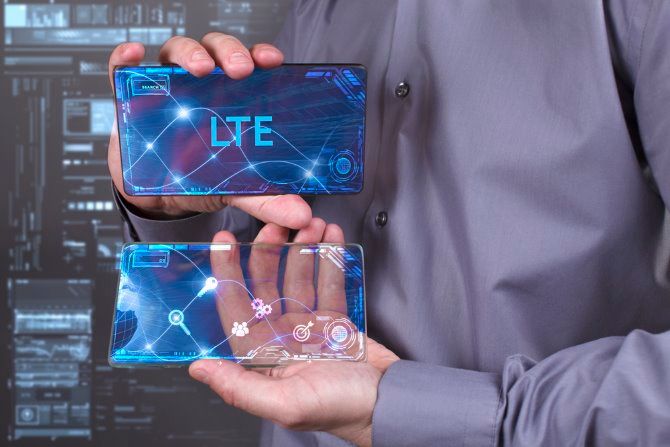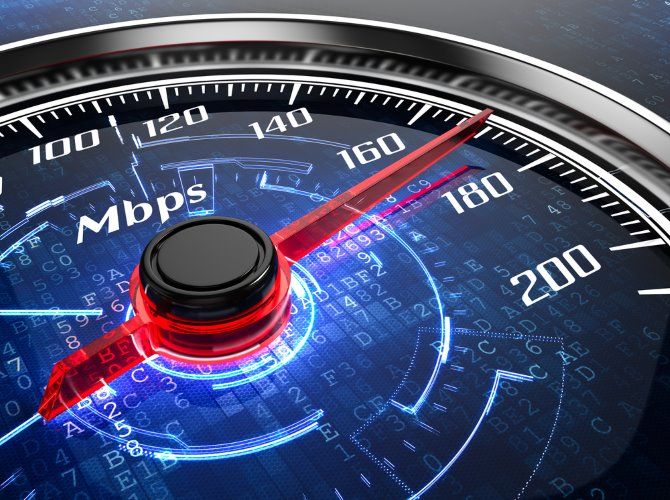If you're an avid mobile user, there's a good chance you've heard of LTE, 4G, and the upcoming 5G. What do these terms all mean, and how do they fare when compared against one another?
Let's explore all of these terms LTE, 4G, and 5G, and decide which one comes out on top.
What Does LTE Mean?
LTE is also called "4G LTE" by network companies; but what does LTE stand for? It's an initialism for "Long Term Evolution" and is the foundation for 4G connections.
The History of LTE
Back when 4G entered the market, there had to be a standard that defines proper 4G speeds. That way, companies wouldn't merely make a slightly faster 3G service and try to pass it off as 4G.
As a result, the regulating board for cellular networks, the ITU-R (International Telegraph Union Radiocommunication), laid down some ground rules on how fast a 4G connection has to be. Downloads had to be 100Mb/s on the move, and 1Gb/s while stationary, to be legally considered 4G speeds.
The problem was, telecommunication companies couldn't achieve the demands that the ITU-R set down at the time. As long as the companies couldn't deliver "true 4G" speeds, they couldn't legally call their network "4G".
Instead, the developing 4G technology went under the name "Long-Term Evolution" to represent that the technology was under development. LTE was faster than 3G but didn't achieve the minimum speeds for 4G.
The History of 4G LTE
But if this is true, then what does 4G LTE mean? The reason why LTE managed to obtain the 4G title was due to the ITU-R lowering the bar for what "4G" means in advertising.
The ITU-R noted the struggles of companies trying to achieve 4G speeds and how long the process was taking. As such, they declared that a cellular network could be recognized as 4G if the company can prove their rates are significantly higher than 3G. LTE accomplished this, and as such became known as "4G LTE."
Eventually, LTE would get itself to near-4G speeds, using a technology called LTE-A (or LTE+). The "A" in LTE-A means "advanced," and represents the next step up in LTE technology. This 4G LTE-A technology is what's most used when companies state they have 4G, as some still haven't truly mastered 4G speeds.
What Does 4G Mean?
4G's odd name comes from the line of heritage before it. The "G" stands for "Generation," and "4G" represents how this technology is the fourth generation of cellular broadband technology. It's the next step up from the technology that preceded it, called---you guessed it---3G.
4G connections meet the standards we stated above---100Mb/s while moving, and 1Gb/s while stationary. Anything that achieves less is 4G LTE.
What Does 5G Mean?
As you might have guessed, 5G is the successor to 4G. At the time of writing, 5G hasn't taken off yet. It's still in the development phase as cellular companies set up the infrastructure needed to support it. Once it's off the ground, there will be no reason to stick with 4G anymore.
When it comes to 5G vs. 4G LTE, 5G beats it both in latency and in download speeds. This increase is very promising for the world of the internet of Things (IoT), especially with smart cars, as 5G can handle data much better than 4G can.
Comparing Speeds: 4G LTE vs. 4G vs. 5G
So, how fast does each one go? To answer this, we shouldn't look at what the companies say their network speeds are; instead, we can get a non-biased view by looking at studies performed by OpenSignal, a mobile analytics company.
4G vs. 4G LTE Speeds
As we explored above, a network needs to supply 100Mb/s while you're on the go to earn the 4G title. OpenSignal's report called "The State of Mobile Network Experience" aims at taking a snapshot of 4G performance before the big 5G revolution arrives.
On page 5 of the report, there's a chart showing the average download speed for each country. South Korea comes out on top with a download speed of 50Mb/s; however, that's still a far cry from the 100Mb/s.
Other countries don't put up much of a fight. The US, for instance, has an average download speed of 21.3Mb/s. 35 countries find themselves in the 10-20Mb/s range, which is the most populated category.
5G vs. 4G LTE Speeds
OpenSignal also reported on 5G maximum speeds vs. 4G speeds. Note that this statistic is the fastest each network can physically go; it doesn't represent the average real-world speeds of each network.
In the report called "5G boosts the maximum real-world download speed by up to 2.7 times 4G users’ top speeds," OpenSignal found the size of the gap between 4G LTE and 5G varied depending on the country.
The US's 5G top speed was 2.7 times that of its 4G LTE top speeds, while Australia's 5G speeds were actually slower than their 4G. As such, when 5G rolls out across the world, we may see wildly different speeds across each country.
These numbers aren't accurate representations of the average user experience, though. To get a reliable idea of how fast 5G is right now, we need to look at real-world tests and examples.
OpenSignal carried out a study in South Korea, which has a robust 5G presence. In their article "5G smartphone users experience 111.8 Mbps average download speed," they saw that South Korean 5G users saw an average speed off 111.8Mb/s---that's faster than "true" 4G speeds already.
This speed is a considerable increase over 4G flagship phone users, which saw speeds of 75.8Mb/s. It's an even more significant jump from general 4G phones, which had reported speeds of 47.7Mb/s.
Given South Korea's reported average speed in the first study was 50Mb/s, it's safe to say the majority of users have general 4G phones. As such, the majority of South Koreans would see a 134 percent increase in their speeds by making the jump to 5G.
Comparing 4G LTE, 4G, and 5G Speeds
|
Maximum Download Speed |
Theoretical Average Speed |
Real-World Average Speed |
|
|---|---|---|---|
|
4G LTE |
100Mb/s |
30-60Mb/s |
2-50Mb/s |
|
4G |
1Gb/s |
100Mb/s |
N/A |
|
5G |
20Gb/s |
200-1000Mb/s |
111.8Mb/s |
Now we have an idea of how fast each network is, we can compare them against one another to see the current state of mobile networks.
4G LTE's maximum speed comes in at around 100Mb/s; any faster than that, and it would be "real" 4G. The theoretical speed is what 4G LTE providers claim customers can expect from the network. As we can see, the rate you'll see is quite low compared to what's promised, and still a long way from achieving those "true 4G" speeds.
4G's definition is a network delivering 1Gb/s while the user is stationary, and 100Mb/s on the go. Given how 4G cannot achieve either of these conditions, we can't state what 4G's real-world speed is.
Despite this, 5G's performance is pretty good, despite being new. The maximum speed that 5G can theoretically go is 20Gb/s. Companies claim you can achieve speeds between 200Mb/s and 1Gb/s on their 5G networks, which is achievable in speed tests; however, you'll only see these speeds on a city-exclusive system with light traffic.
In a country where 5G is more widely adopted such as South Korea, you're likely to see speeds more around the 100Mb/s mark. While it's somewhat slow for 5G standards, we're finally pushing past the speeds that 4G was trying to achieve, even on a busy network.
Is It Worth Upgrading to 4G?
If you're currently using a 3G phone, you may be thinking about making the jump to 4G. Unfortunately, an upgrade to 4G may not just be a luxury; it may soon be a requirement!
Some large network providers are now phasing out 3G to make room to introduce 5G. It makes sense, as 4G phones are now the most popular kind on the market.
Clark reported on how AT&T and Verizon are both scrapping their 3G networks, which will leave 3G phones without a signal. As such, if you're still using 3G today, it's very much worth looking into upgrading to a 4G phone before the cutoff deadline.
It's also worth jumping ship for the faster speeds alone. If we want to compare 3G vs. 4G LTE+ speeds, we only need to look at the OpenSignal table. The table claims that 3G has a realistic download speed of 8Mb/s, while 4G LTE+ goes up to 90Mb/s---over 11x faster. These rates mean that upgrading your 3G phone will vastly increase your download speeds while also keeping your phone relevant.
Unfortunately, you can't download an app or get a new SIM to turn a 3G phone into a 4G one. Don't worry, however; a 4G-compatible phone doesn't have to be expensive. You'll find plenty of 4G unlocked phones under $200, for example.
Is It Worth Upgrading to 5G?
While 5G phones aren't standard in the marketplace, there are plans to start selling more of them as time goes on. There are good 5G smartphones available. Is it worth replacing your 4G phone with a new 5G one?
At the time of writing, it seems a bit early to jump onto the 5G bandwagon. Not only are the phones that support it expensive, but the data plans can cost a lot more than 4G plans. The data rate is around twice the speed of 4G, which may not justify the cost for some. You might also want to learn about 5G security risks.
As such, upgrading to 5G is best if you have money to burn and you're excited about trying this new technology. Otherwise, you'll be better off waiting for 5G to get a stronger foothold in the market and for 5G phones and plans to come down in price.
Choosing the Right Network for You
When it comes to 4G LTE vs. 4G vs. 5G, you'll find that 4G LTE's advanced speeds are closing in on becoming "true 4G", to the point where the two of them will be pretty indistinguishable. Meanwhile, 5G can potentially improve speeds by over double that of 4G LTE and will pave the future for the Internet of Things---right now, however, it's still quite expensive.
If you'd like to learn more about 5G, be sure to study up on what 5G is and how it'll improve mobile internet.




